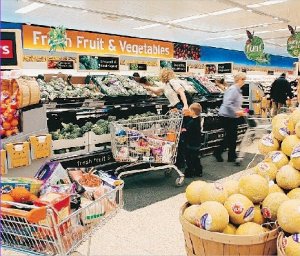Yet most people believe food is becoming more expensive, particularly in New Zealand.
Concerns about food security (quantity of food available globally) do have an effect on price, as does the health of the global economy. Food safety also impacts on prices and costs – an Escherichia coli outbreak or melamine scare creates a demand for safe products and prices increase.
The range of items now in supermarkets accounts for some of the challenges in comparing ‘food spend’ in different countries, and what constitutes the ‘average’ food basket also changes: last year the basic food basket in New Zealand included frozen berries, chicken nuggets, dried apricots and flat bread.
The biggest confusion, however, is in such factors as GST (or VAT) and on how much tax payers are indirectly giving to farmers directly through subsidies.
In the OECD countries an average 18% of gross farm receipts are from subsidies. In New Zealand there are no farm subsidies, hence consumers are not paying an unknown extra for their food via taxes on their wages and salaries.
True, food prices have increased over the last 20 years, but production costs have increased by far more: 45% for food and over 60% for costs. MPI calculates many farmers are now losing money, but keep farming in the hope they will achieve capital gains.
The reality in the market is that SOE Landcorp, New Zealand’s largest farmer, estimates a 2-3% return for sheep and beef enterprises and a 4-5% return for dairy. In contrast, Standard and Poor estimates return on capital invested in supermarkets is about 16%. Supermarkets can afford to play with prices.
Over the year to May 2012, cheddar cheese decreased in price 15%, butter 25%, potatoes 13% and chicken 5.3%. Milk also decreased in price (by 7.2%) despite the fact Fonterra froze the price for the domestic market in February 2011 when the global price escalated. Supermarkets have been challenged by smaller outlets using milk as a loss leader, relying on the increased effect of impulse buying to boost sales overall.
In a Westpac survey released last year, people aged 18 and over were found to spend on impulse about $5/day ($16 million for the country) mostly at supermarkets, cafes, petrol stations and fast food outlets. This is 50% of the cost of the daily basic-diet food for an adult (University of Otago research).
The argument that food should be cheaper in New Zealand because we are a food-producing country overlooks the fact much food is imported, and the return to the farmer is decreasing.
As society imposes increased environmental and animal welfare regulations, and power, fuel and labour costs escalate, farm returns will decrease even further.
Only if food prices increase will primary production be sustainable. More money on-farm means greater capability to implement the new technologies that increase productivity while maintaining or improving environmental protection.
In Europe at least part of the subsidies are directed at supporting the environment; New Zealand farmers pay their costs from returns from selling their milk, meat and wool.
Paying more for high quality, sustainably-produced food makes a lot of sense for the environment.
• Jacqueline Rowarth is a professor of agribusiness at the University of Waikato.

















